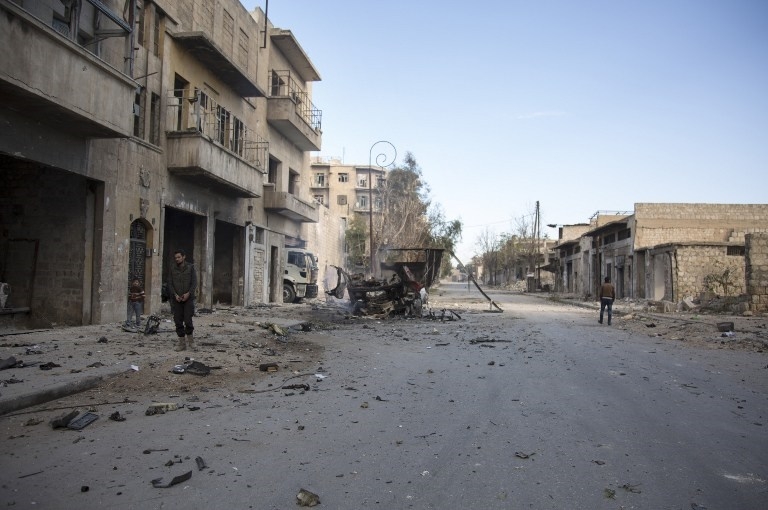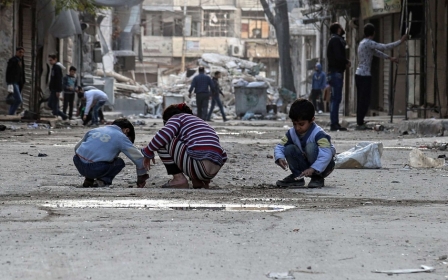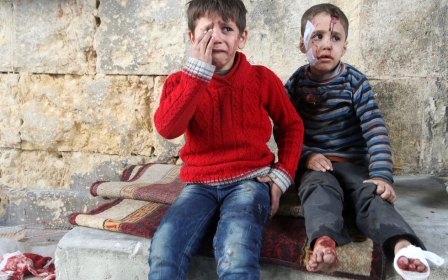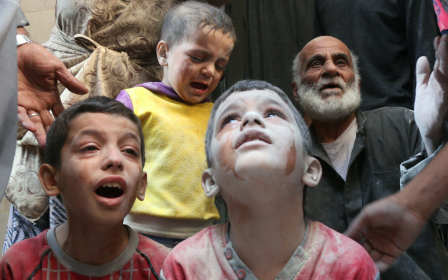Battle of Aleppo: All eastern region hospitals out of service, WHO says

Civilians were killed and wounded in government air strikes, barrel bomb attacks and artillery fire on the rebel-held side of Syria's Aleppo city on Saturday, as hospitals were reportedly put out of operation.
At least 27 civilians were killed in the government-led air strikes, said the Syrian Observatory for Human Rights, which reported earlier on Saturday of massive bombardment across the eastern side of the battered city, five days into a renewed government assault on opposition-held districts.
"There's barely a neighbourhood that has been spared in the east," said Observatory director Rami Abdel Rahman.
But according to the Syrian Civil Defence Force, the death toll is much higher, reaching 56 civilians dead and 280 people injured by over 370 Syrian government air strikes and shelling on the besieged area on Saturday.
The deaths brought the civilian toll in five days of regime bombardment of eastern Aleppo to at least 92, according to the Observatory, which said however that many of the wounded were in serious condition.
‘All hospitals out of operation’
The news comes amid reports that the intense government air strikes and artillery fire on the rebel-held side of Aleppo have caused all hospitals to be taken out of operation and forced schools to close.
All hospitals in Syria's rebel-held eastern Aleppo are out of service after days of heavy air strikes, its health directorate and the World Health Organisation (WHO) said on Friday.
"This destruction of infrastructure essential to life leaves the besieged, resolute people, including all children and elderly men and women, without any health facilities offering life-saving treatment ... leaving them to die," said Aleppo's health directorate in a statement sent to Reuters by an opposition official.
US National Security Adviser Susan Rice said Washington condemned "in the strongest terms these horrific attacks against medical infrastructure and humanitarian aid workers".
"There is no excuse for these heinous actions," she said.
"The Syrian regime and its allies, Russia in particular, bears responsibly for the immediate and long-term consequences these actions have caused in Syria and beyond."
Elizabeth Hoff, the WHO representative in Syria, said a UN-led group of aid agencies based over the border in Turkey "confirmed today that all hospitals in eastern Aleppo are out of service".
However, the Syrian Observatory for Human Rights, a Britain-based war monitor, said some hospitals were still operating in the besieged parts of Aleppo but that many residents were frightened to use them because of heavy shelling.
According to a statement on Friday by the Independent Doctor’s Association (IDA), which runs the only children’s hospital in east Aleppo, the medical facility was taken out of service after it was hit by two missiles.
Other hospitals had also been taken out of operation in the past 48 hours after repeated attacks by Syrian and Russian airplanes, reported activists and workers.
French NGO Medicine Without Borders, which supports hospitals in Aleppo’s rebel-held areas, described the bombing of hospitals as a "dark day for east Aleppo".
‘Syrians being exterminated
Director of the IDA Dr Hatem told Middle East Eye on Saturday that Syrians were being “exterminated” by Syrian government and Russian warplanes.
“We cannot believe that the world’s most powerful countries can't stop children’s hospitals being bombed and hundreds of thousands facing starvation,” said Dr Hatem.
He called on the international community to “use their influence to stop these bombs".
The IDA, which provides health care for a million Syrians, also said that medical staff risked their lives to save children put in incubators after power to the underground medical facility was cut off.
Footage taken by Al Jazeera from a hospital on Friday showed patients and staff struggling to breath after a medical facility was hit by bombs containing toxic gas.
Three cases of suffocation were also reported by the Al Jazeera, with many patients filmed wearing breathing masks.
Many hospitals including the children's hospital, have been forced to go underground, in an attempt to keep patients safe from aerial and artillery bombardment by Russian and Syrian government forces.
But the Syrian opposition and the United Nations have claimed that Russia is using bunker-buster bombs in Aleppo which are capable of destroying underground shelters and command centres, reported the Guardian in September.
Schools shut down
The ferocious bombardment saw rockets, mortar shells and barrel bombs pound residential neighbourhoods, shaking buildings and terrifying residents, an AFP correspondent in east Aleppo said.
"People went to sleep to the sound of bombardment and awoke to the sound of bombardment," said the Syrian Observatory for Human Rights.
Schools, many of which already operate from basements because of government attacks, announced in a statement they would close Saturday and Sunday "for the safety of students and teachers, after the barbarous aerial strikes".
Syrian government troops unleashed their assault on the rebel side of the city on Tuesday, as they once again press to recapture the opposition-held districts of divided Aleppo.
The fate of the 250,000 Syrian civilians remains unclear as the population continues to live under siege and people are prevented from reaching urgent medical care.
This is of particular concern as the bombardment by the Syrian and Russian government continues to intensify as they attempt to take control of the rebel held areas.
No aid has entered the city's eastern neighbourhoods since government troops surrounded them in mid-July, and humanitarian organisations announced last week food aid is running out. More than 250,000 people remain in the opposition-held part of the city.
Once the country's economic powerhouse, Aleppo has been ravaged by the war, which began in March 2011 with anti-government protests and has since left more than 300,000 people dead.
The city has been divided between government control in the west and rebel control in the east since mid-2012.
New MEE newsletter: Jerusalem Dispatch
Sign up to get the latest insights and analysis on Israel-Palestine, alongside Turkey Unpacked and other MEE newsletters
Middle East Eye delivers independent and unrivalled coverage and analysis of the Middle East, North Africa and beyond. To learn more about republishing this content and the associated fees, please fill out this form. More about MEE can be found here.




